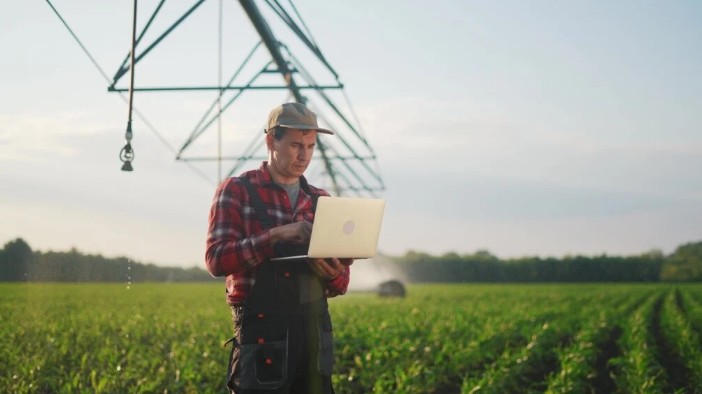Small farmers, large entrepreneurs, experts, and authorities came together this Tuesday at a sectoral roundtable held in Los Angeles to analyze how artificial intelligence (AI) can boost the agricultural and forestry sectors in the Biobío province.
The initiative aims to use technology to make processes more efficient, particularly regarding water usage and daily operations, while also helping the region remain competitive through digitalization and smart data management. During the meeting, it was highlighted that countries like the United States, China, and India are already at the forefront of AI use in agriculture. In China and India, for example, they employ everything from autonomous tractors to drones that monitor crops and apply AI-assisted genetic improvement techniques.
In Europe, Germany has increased its adoption of these technologies by over 13% in the last year, according to a recent study. In Latin America, Chile leads with investments exceeding $8 billion for infrastructure, training, and support for SMEs.
Similarly, AI adoption in agriculture has already reached 80% nationwide, well above the global average. However, in the Biobío region, the figure drops to 60%, revealing persistent technological gaps.
CHALLENGES AND OPPORTUNITIES IN THE PROVINCE
Local experts explained that agriculture is a complex world, with many variables influencing decision-making, making innovation and the development of new technologies difficult. However, in Biobío, there is a multidisciplinary team—a sort of macro-university—that brings together different fields to tackle these challenges with cutting-edge technology.
It was emphasized that advancing toward models where collaborative robotics helps integrate academia, industry, and producers is crucial, ensuring that technology transfer effectively meets the needs of farmers and sector businesses.
WHAT'S ALREADY BEING DONE IN THE REGION
One of the standout programs mentioned was "Fortalece Pyme," which has so far supported over 200 agricultural entrepreneurs with diagnostics and advisory services to drive their digital transformation. Results show tangible progress in digitalization and data use.
The collaboration between the Agricultural and Livestock Service (SAG) and universities was also praised, as they have implemented image-analysis-based technologies to identify and control pests, helping better protect the territory.
Stakeholders stressed the importance of properly validating and certifying the technologies offered to prevent the use of solutions lacking technical backing or adequate post-sale support.
THE INDUSTRY'S VISION
José Miguel Stegmeier, president of the Biobío Agricultural Society (Socabio), firmly believes that artificial intelligence will reach agriculture, albeit at different paces depending on the sector.
"Agriculture will have its own timeline. It might take a bit longer, but AI will be key to achieving greater productivity, profitability, and sustainability," he said.
In his view, this technological transformation is as significant as mechanization or irrigation technology was in their time. The key to rapid progress is creating strong links between farmers, academia, researchers, and service providers.
Regarding concrete benefits, Stegmeier highlighted that AI can help reduce costs by using precise doses of agrochemicals or more accurate water volumes, improving yield and profitability. He also asserted that robotics can address issues like labor shortages in the industry. As for forestry, Stegmeier noted a significant gap between large companies, which already use advanced technology, and small landowners who lack such resources.
"If we apply AI and other technologies, we could make forestry much more profitable for small and medium-sized farmers," he stated.
THE ROLE OF CORFO
Ximena Riffo Vargas, deputy director of Corfo Biobío, explained that the organization has long been working on the digital transformation of agriculture and forestry.
Therefore, she stated, "For AI to work in agriculture, we need human capital, companies capable of absorbing the technology, and solutions offered in accessible formats for SMEs. We don’t want technology to become a barrier to adoption."
The focus, she explained, is on making small and medium-sized enterprises more efficient and competitive, especially amid rising costs of inputs, water, and energy—areas where AI can make a difference.
Finally, Riffo confirmed that Corfo continues to support AI-related projects, particularly in innovation and entrepreneurship, as well as through Technology Transfer Groups (GTTs), which promote teamwork and the adoption of new technologies.
Source:La Tribuna







Comentarios (0)
No hay comentarios aún. ¡Sé el primero en comentar!
Deja un comentario